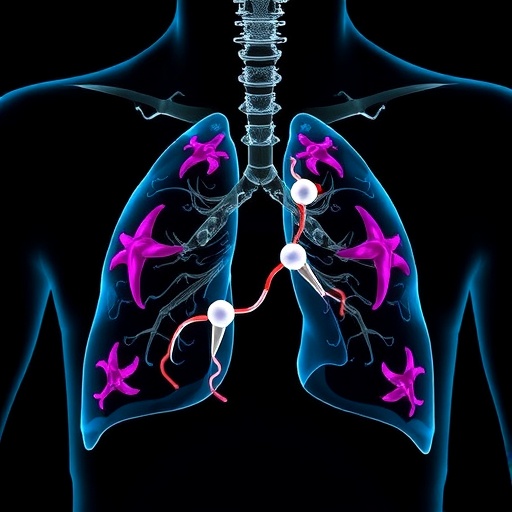In a remarkable new study published in BMC Cancer, researchers have uncovered how the drug chidamide—a histone deacetylase inhibitor—exerts multifaceted anti-cancer effects in lung cancer cells. The investigation sheds light on chidamide’s ability to cripple cancer cell metabolism while simultaneously enhancing ferroptosis, a specialized form of cell death, and improving lung cancer cells’ susceptibility to the chemotherapy drug cisplatin (DDP). At the heart of this molecular complexity lies the downregulation of ubiquitin-specific protease 35 (USP35), a protein that this study identifies as a pivotal target in lung cancer malignancy.
Lung cancer remains one of the deadliest cancers worldwide, in part due to its ability to develop resistance to conventional therapies like cisplatin. The current research addressed this critical hurdle by exploring how epigenetic modulators such as chidamide influence cancer cell survival mechanisms. Prior to this investigation, the detailed mechanisms underlying chidamide’s role in lung cancer, especially regarding metabolic pathways like glycolysis and cell death pathways such as ferroptosis, were poorly understood.
Using a battery of in vitro assays including Cell Counting Kit-8 for cell viability and half maximal inhibitory concentration (IC50) determinations, the research team systematically evaluated how chidamide affects lung cancer cell proliferation. They found that chidamide markedly diminishes the viability of these cancer cells, suggesting potent growth-inhibitory effects.
One of the striking findings relates to chidamide’s impact on cancer metabolism. The researchers measured glucose uptake, lactate production, and intracellular ATP levels—hallmarks of glycolytic activity—and demonstrated that chidamide effectively disrupts glycolysis in lung cancer cells. Since glycolysis is a primary energy source driving tumor growth under hypoxic conditions, its inhibition could severely impair tumor survival and progression.
Beyond metabolism, the study delves into the realm of ferroptosis, a form of regulated cell death associated with iron-dependent lipid peroxidation. By measuring reactive oxygen species (ROS), glutathione levels, and ferrous ion (Fe2+) accumulation, the investigators confirmed that chidamide fosters a cellular environment favoring ferroptosis. This is particularly noteworthy because ferroptosis is emerging as a critical vulnerability to exploit in cancer therapeutics, especially in tumors that have become resistant to apoptosis.
Central to these processes is USP35, a deubiquitinating enzyme identified here as a molecular target of chidamide. The authors demonstrate that chidamide binds to USP35 and reduces its protein expression in lung cancer cells. This downregulation appears to mediate the suppression of glycolysis and promotion of ferroptosis, uncovering a novel pathway by which chidamide exerts its anti-cancer effects.
The interplay between USP35 and cisplatin sensitivity was also explored. Owing to its role in regulating protein stability, USP35’s suppression by chidamide was linked to enhanced susceptibility of lung cancer cells to cisplatin. This was validated through colony formation assays and flow cytometry, revealing that chidamide not only impairs growth but also sensitizes cancer cells to this frontline chemotherapeutic agent.
Translating these findings from the bench to in vivo models, the team employed tumor xenograft assays in mice, which confirmed that chidamide treatments significantly curtailed tumor growth. Furthermore, the combination of chidamide and cisplatin yielded additive effects, markedly increasing tumor sensitivity to cisplatin, which could herald new combination treatment strategies.
This comprehensive study, therefore, establishes chidamide as a potent adjunct in lung cancer therapy, functioning through dual mechanisms that cripple tumor metabolism and trigger ferroptotic cell death. By targeting USP35, chidamide not only stalls tumor progression but also restores chemosensitivity, offering renewed hope against lung cancer’s notorious treatment resistance.
Understanding the mechanistic intricacies of histone deacetylase inhibitors such as chidamide may be instrumental in crafting future lung cancer treatments. The modulation of metabolic pathways like glycolysis and cell death pathways like ferroptosis could present new therapeutic windows, particularly in tumors refractory to current standards of care.
While further clinical validation is necessary, this study lays a robust foundation for developing combination therapies that exploit metabolic and epigenetic vulnerabilities in lung cancer. The targeting of USP35, a previously underexplored deubiquitinase, opens a novel avenue that might also extend to other cancers exhibiting similar resistance profiles.
In summary, chidamide emerges as a promising candidate not just for impairing lung cancer cell survival through blocking glycolysis, but also for enhancing vulnerability via ferroptosis and improving the effectiveness of cisplatin chemotherapy. These findings underscore the importance of integrating targeted molecular approaches with conventional treatments to overcome lung cancer’s adaptive resilience.
As the scientific community continues to unravel the complexities of tumor biology, such multidimensional therapeutic strategies could revolutionize treatment paradigms, potentially improving survival outcomes for patients afflicted with notoriously aggressive forms of lung cancer.
This study serves as a compelling example of how epigenetic drugs, metabolic modulators, and cell death mechanisms intersect, and sets the stage for the next generation of lung cancer therapies that are both more precise and more effective.
Subject of Research: Molecular mechanisms underlying chidamide’s effects on glycolysis, ferroptosis, and cisplatin sensitivity in lung cancer cells.
Article Title: Chidamide impedes glycolysis but increases ferroptosis and cisplatin sensitivity of lung cancer cells through downregulating USP35.
Article References:
Wang, K., An, L., Zang, A. et al. Chidamide impedes glycolysis but increases ferroptosis and cisplatin sensitivity of lung cancer cells through downregulating USP35. BMC Cancer 25, 1504 (2025). https://doi.org/10.1186/s12885-025-14925-z
Image Credits: Scienmag.com
DOI: https://doi.org/10.1186/s12885-025-14925-z





